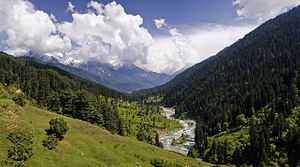Last week, India reacted to the shock emanating from the latest violation of the ceasefire with Pakistan across the Line of Control (LoC) in Kashmir. An outraged nation received the news of the death of two Indian soldiers whose bodies had been mutilated. One was an Indian Army soldier and the other a Border Security Forces head constable. A third was believed to have possibly escaped, while at least five others were injured in a firefight.
The attack took place in the Poonch District of Jammu and Kashmir, where a Pakistani Border Action Team (BAT) allegedly set up an ambush awaiting a patrol party. This attack occurred soon after the Pakistani Army chief General Qamar Javed Bajwa had assured support to Kashmiris while visiting areas along the LoC.
Immediately, Indian Army chief General Bipin Rawat embarked on a two-day visit to the Kashmir Valley to take stock of the encounter and to plan for the aftermath. Expecting further challenges in the upcoming summer months, Rawat asked the troops to ready themselves and to be wary of infiltration and possible ceasefire violations. He also double-checked the operational and logistical preparedness of the troops.
In a statement to his military counterpart in Pakistan, the Indian director general of military operations (DGMO) expressed his grave concern at the incident. Calling it an inhuman act beyond norms of civility, he declared that it required unequivocal condemnation and response. On the other hand, the Pakistani DGMO flatly denied the allegation that this was the work of the Pakistani army. Calling the Pakistani army a professional outfit, he in turn declared that this was India’s attempt to deflect from the situation on ground in Kashmir.
Politicians in India have been far from silent on the issue. In the week after the incident, it surfaced in talks between Prime Minister Narendra Modi and Defense Minister Arun Jaitley, though the exact nature of the conversation has not been disclosed. The Pakistani high commissioner was also summoned by New Delhi, which expressed outrage to the Pakistani envoy for the third time in the past year. Evidence of a blood trail has reportedly been unearthed, with DNA samples sent for testing in an attempt to pin down Pakistani involvement with proof.
Opposition parties in India have lost no opportunity to call the Modi government inactive, asking them to take steps to avenge the deaths. Further criticism was levied over the fact that the Defense Ministry was an additional charge for Finance Minister Jaitley, with Congress members asking the central government to devote all efforts toward a full-time defense policy.
The situation in Kashmir has been particularly volatile over the past few months, with Indian intelligence claiming that at least 20 new Pakistan-backed militant camps had been opened up along the LoC. At least seven ceasefire violations were recorded in April 2017 alone. While the two nations have been trading barbs, Kashmiris living along the LoC live in an escalated environment of fear.
Mere days after the incident, a 5,000 strong force was deputed to the Shopian district of Kashmir in an attempt to comb out militants. The civilians in key areas along the heat zone have expressed fear and frustration at having their lives thrown astray every time any ceasefire violation occurs. The increasing anger on the part of the Indian army and the political elite, combined with the increased frustration of Kashmiris caught in this web of violence, makes for a deadly combination. Most recently, the fear of intelligence getting passed across the border has resulted in a crackdown on social media in the valley.
Both India and Pakistan have a lot to lose by appearing as the weaker side after decades of relentless conflict over Kashmir. However, neither has anything to gain by not taking cognizance of the temperature among civilians in Kashmir. As the armed forces incur heavier losses on both sides and as politicians and citizens clamor for blood, there appears to be little chance of de-escalatory moves.

































